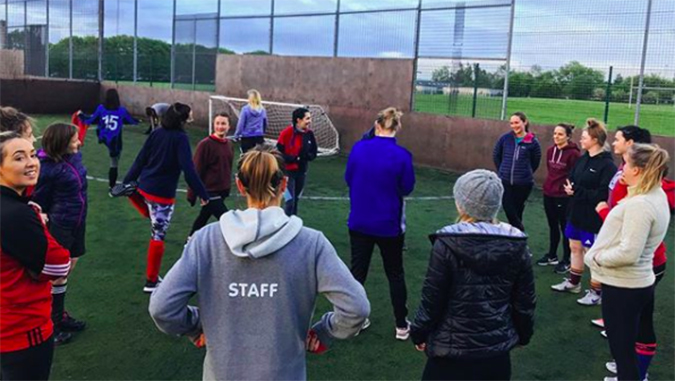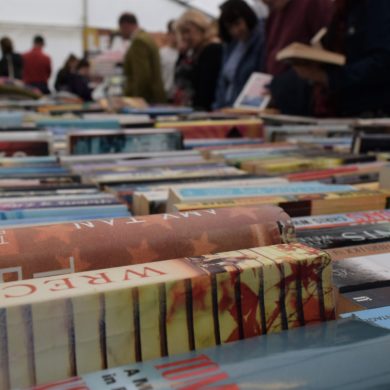A large number of older women are taking up football again, but how easy is it for them to get back into the game?
It’s half-time at Trelai Park, where Cymric Women FC are facing off against Penarth Women in their second ever competitive game. Cymric stand in a circle, gulping down water and taking a well-earned breather.
“Two minutes ‘til the second half!” says their captain, Gwenan.
“You forget that some of us are a good twenty years older than you,” says Sian, lying on the grass. “I need about half-an-hour to recover!”
The team laugh before getting into a huddle, arms around each other. “I’d settle for a draw at this rate, guys,” says Sian, clutching at her sides. “I reckon they’ll be pumped up for the second half, they’ll thrash us.”
“Either way, if we keep the teamwork going and just have each other’s backs, we’ll be fine.” says Gwenan.
The girls walk back onto the pitch, patting each other on the back and giving out high-fives to keep that energy up. They’re mothers, graduates, office workers, teenagers, teachers, students, but on that pitch, they’re one team. Penarth Women give them a challenging second-half, but Cymric are a unit. When the final whistle blows, they explode into loud celebration. Their first victory. 4-1.

Women of all ages flocked to Leckwith’s Gôl last September for Cymric Women FC’s first ever training session. Although Cymric has no specific age limits, their founders formed the team with older women in mind. Many of their players are re-igniting their passion for football after years off the pitch. “We founded Cymric Girls’ Football Team because we realised there was a large gap in our lives,” says Bethan, the Team Secretary.
During my late teen years, I didn’t have the opportunity to play football, and after talking to a few of my friends, I realised that there were tons of women who wanted to start again.
Bethan, Cymric Women
Although football seems to be growing in popularity for older women, the Football Association of Wales (FAW) are focusing on getting young girls involved in the game as part of their plan to reach 20,000 female players by 2024. They currently have no schemes aimed at encouraging participation with older girls and women, and are instead focusing on girls aged five to twelve. “As with any sport, trying to get people to get involved in something new as an adult is difficult,” says Katy Evans from FAW. “That’s why we are trying hard to introduce football to more girls in schools and communities earlier so they have the opportunity to build a connection with the sport, hopefully for a lifetime, so that they’re more likely to return to it later on in life.”
It seems strange to some that the FAW aren’t doing more to encourage older women to participate, especially as teams like Cymric prove its popularity in that age group. But it’s not only Cymric who prove football’s popularity with older women, as over the last few years, events like the FA People’s Cup Over 35s competition have seen great increases in participation. In their 2016 tournament, six teams entered the competition, compared to a whopping 52 teams in 2018. Although the FAW may not provide specific pathways for older women, there are now more opportunities than ever before for them to get back in the game. “I was fortunate enough to play at the top level,” says former Wales captain, Professor Laura McAllister. “But I still play Vets football now and I really enjoy it. It just gives women who might not be particularly fit, or who stopped playing after having children the chance to come back to the sport they love.”

Opportunities for older women to get back into the game seem to be on the rise despite no input and a lack of provisions from the FAW. The Go Where Women Are report revealed that women around 35 years old were twice as likely to pick up a new sporting hobby than women half their age, citing increases confidence levels as the main reason for this. “I think it actually might be easier to attract older girls and women to play football,” says Ffion from Cymric.
By the time they turn 30, women are more sure of themselves – they care less about what people might think than teenage girls do, so they’re more likely to join. But it’s finding that team to join that can be difficult.
Ffion, Cymric Women
Finding a team seems to be the main obstacle for older women wanting to play football, but tournaments and football tours for older women can help spread the word about teams that already exist, like Penarth Women. This summer, they travelled to Partis to compete in an over 30s tournament for recreational teams. “Before we went on tour, we’d get maybe 15 girls coming to training,” says goalie and captain, Victoria. “But after coming back, our numbers at training have nearly doubled.”
This level of exposure for older women’s football is crucial in order to attract more players, as women 30 or older are often described as ‘the generation that football missed’. “Women’s teams need more of a push than girls’ teams do,” says Victoria. “We need that attention, we need that media coverage, otherwise women looking for us won’t know we’re here.”
Whilst these recreational teams may not be fostering the talents of the next footballing greats, they’re just as important for older women with regard to their physical health. Playing football has been proven to improve balance, muscle strength and bone density specifically for those women who start playing in adulthood. “I work in an office, which means I don’t get a lot of time to move around,” says Bethan. “Coming here once a week really makes me feel like I’m getting my fitness back on track – and having fun doing it!”
Football is not only beneficial for women’s physical health, but it’s also been proven to reduce stress levels. For the many women playing for Cymric who work nine-to-five jobs, the team provides a well-needed break from their busy schedules. “It definitely helps me clear my head,” says Non, one of Cymric’s founders. “It’s not just the physical stuff – learning new skills, keeping fit – but it’s the social side of things that’s really important. I’m now a part of this community of women of all ages who inspire and motivate each other, which is such a comfort.”

Another benefit of playing football, especially in teams that cater to a wider age range, is that it’s a great opportunity for women from different generations to bond. Jo is 38 and has watched her daughter, Kayleigh, at football games since she was eight years old. Both mother and daughter decided to join the Cardiff Bluebelles Development Squad when Kayleigh turned 17. “When I was younger, girls’ football wasn’t as up-and-coming as it is now,” says Jo, “So I didn’t have the opportunities Kayleigh’s had to get into it.”
Sports and physical activity has been proven to strengthen family bonds, and so if more women Jo’s age started playing the game, perhaps they could inspire their own daughters to start too – which would be a win-win for the FAW and their ambitious target for 2024. “Having Mum come with me to trainings has brought us a lot closer, even if she does embarrass me occasionally!” says Kayleigh.
I stopped playing football when I was about fifteen, but I was a lot less nervous to start again because I had Mum with me for moral support.
Kayleigh, Cardiff Bluebelles
Seeing as all-ages teams attract both younger and older women, perhaps the FAW could increase provisions for all ages, as it’s not only girls aged five to twelve who are showing increased interest. “There certainly is a gap that the FAW needs to fill with regards to women my age,” says Bethan, who just celebrated her 37th birthday. “We didn’t have that support in school, and although it’s great that the support is there for school girls now, but because we missed out on that support, we do need that encouragement too.”
With female football participation on the rise once again in the UK following the Women’s World Cup, perhaps now is the time for the FAW to look at the bigger picture, and to realise that older women play an equally important part in reaching their target as school girls do. “It is harder for women our age to start again from scratch with football,” says Bethan. “It’s hard not to feel forgotten about sometimes, as older players. But hopefully, if we keep our winning streak going at Cymric, and start attracting even more players, the FAW will have no choice but to sit up and take notice – we won’t be ignored for much longer!”

